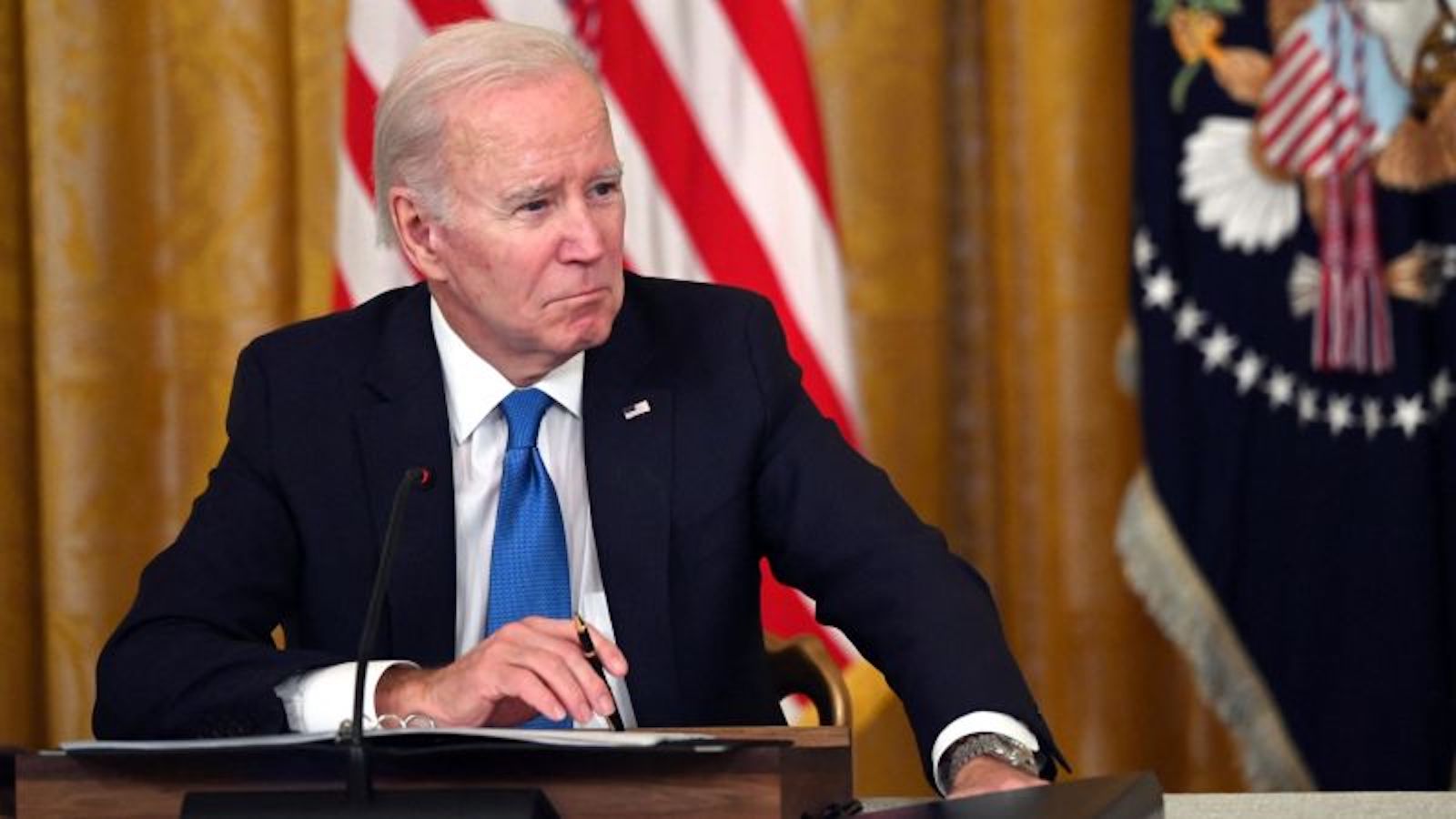Tension between China and the US over the demolition of unidentified objects 4:46
(CNN) --
Fighting a Cold War was bad enough.
Freeing two at once would be impossible.
Two years into the Joe Biden presidency, the United States now faces simultaneous diplomatic and national security crises with its rival 20th-century superpower, Moscow, and its main 21st-century adversary, China.
The war in Ukraine, about to reach a blood-soaked one-year anniversary, and a spy balloon drama that has provided a first tangible symbol for many Americans of an emerging challenge from Beijing, are creating a tense moment in global geopolitics.
This revived era of great power rivalry, which would have seemed a distant prospect in the previous two decades consumed by the war on terror and the wars in the Middle East, underscores the heavy burdens and responsibilities that fall on a president whose worldview is framed after his arrival in Washington in the 1970s in the midst of the US-Soviet cold war.
This dangerous period will crystallize this weekend when Western foreign policy experts and officials gather for the annual Munich Security Conference, which will be dominated by the deepening war in Ukraine.
But the event will also become a stage for the US-China rivalry with Secretary of State Antony Blinken and top Chinese diplomat Wang Yi in town.
The State Department says no meetings are planned as details about China's global balloon spy program emerge and allegations fly across the Pacific.
advertising
Putin invites Xi Jinping to Moscow in 2023, says Russia-China relations are the best ever
Is China reaching out to Russia to support it in the war?
4:44
The twin diplomatic crises have also exposed how bitterly polarized politics in Washington could influence US foreign policy and the political capital any administration needs to pursue its goals.
Fervent Republican criticism of Biden's failure to shoot down a Chinese surveillance balloon before it crossed the continent, followed by claims that he is happy to shoot down unknown aerial objects afterward, show that, for many in the GOP, geopolitics Criticism is just another excuse to settle partisan scores.
Biden may have played into this by not speaking publicly to Americans about a trio of incidents involving planes misbehaving over the weekend.
But more broadly, the Republican Party's abdication of the internationalist principles that won the Cold War against the Soviet Union, its divisions over Ukraine funding, and the possibility of another White House term for Donald Trump, who turned the US foreign policy in a mirror image of his volatile temper raises even more questions as the 2024 election looms.
Chinese leader Xi Jinping and Russian President Vladimir Putin, at the Diaoyutai State Guest House in Beijing, China, on February 4, 2022. (Li Tao/AP)
How are the confrontations with Russia and China different and similar?
Many foreign policy pundits might dismiss the loaded term Cold War in relation to current confrontations with Moscow or Beijing.
The United States is not locked, for example, in the global ideological, economic, and political struggle with Russia as it was with its predecessor, the Soviet Union, from the late 1940s to the late 1980s. By any measure, apart from nuclear weapons, the United States is much more powerful than Russia.
Meanwhile, the war in Ukraine and a series of disastrous battlefield defeats have exposed the myth of Russian superpower strength, even if that post-Soviet nuclear arsenal means President Vladimir Putin can wield the threat of Armageddon to avert direct western intervention.
There is still time, meanwhile, to prevent the growing test of strength between the United States and China from becoming the kind of conflict that could plunge the world into war.
And the US and Chinese economies are intertwined in a way that is unparalleled in the isolated communist Soviet Union.
The Americans and the Chinese have a strong incentive to prevent their differences from escalating because both would pay a huge economic price for any armed military confrontation.
At the same time, however, there is a growing sense that the world is divided into two camps between democracies and autocracies, even if Russia's attempts to trigger a generational fear of the US by reaching out to China may be overstated so far.
ANALYSIS |
Welcome to the Cold War without communism
Is China's armament increasing?
This is what we know 2:46
The Cold War could have ended with the defeat of the Soviet Union.
But it was never over in the mind of Putin, the KGB officer who left East Germany when the Berlin Wall fell and who has spent his more than 20 years in the Kremlin challenging the West and trying to restore respect for Russian power.
Putin sees the Ukraine war as an attempt to regain influence over Ukraine, a former Soviet republic, to crush its sovereignty and frustrate its aspirations to join the Western clubs: the European Union and NATO.
His invasion of Ukraine broke the post-Cold War territorial agreement in Europe.
While doing everything he can to avoid triggering a direct confrontation with Russia, Biden is now not shying away from raising the huge stakes in the war for the Western lifestyle that prevailed in the Cold War.
He has sent billions of dollars worth of US weapons into a proxy conflict that he called "a test for eternity."
A test for America, a test for the world” in his State of the Union address last week.
“Such a defense is important to us because it keeps the peace and prevents would-be aggressors from threatening our security and prosperity,” Biden said, in remarks that could also have been directed at Chinese nationalist leader Xi Jinping.
Definition of the US fight with China
The US confrontation with China is also increasingly about values, as well as a shadow fight between two great militaries and two nations that want to be the lead dog in the Asia-Pacific region.
When the United States talks about ensuring that China maintains a rules-based system in terms of trade, the economy, territorial claims, freedom of naval navigation and military affairs, leaders in Beijing perceive an attempt to limit what they see as the legitimate rise of their country to power with international laws biased towards the West.
Biden, who has framed much of his foreign policy under the assumption that the key strategic question of the current century will be challenging Beijing, has repeatedly stressed that he wants "competition, not conflict" with China.
But he also insists that the United States will challenge what it sees as China's aspirations.
"The People's Republic of China is the only competitor with the intent to reshape the international order and, increasingly, the economic, diplomatic, military, and technological power to do so," said Biden's National Security Strategy, released last October. "Beijing has ambitions to create an enhanced sphere of influence in the Indo-Pacific and become the world's leading power."
US-China trade hits record by 2022 1:00
Bitter Politics Sparked by America's Challenges Abroad
The increasingly tense global political climate is influencing US domestic politics in two notable ways.
It is fueling an effort by Republicans, seen especially in the ongoing Chinese balloon drama, to portray Biden as a weak commander-in-chief unprepared for global challenges ahead of his 2024 election race. This pressure on Washington seems reducing the political margin that the administration has to deal with global threats.
For example, in the absence of any sign of repentance from the Chinese, it would be a great political risk for Blinken to reschedule a trip to Beijing, which is vital to limiting tensions, any time soon.
And the way in which Biden went into action over the weekend to shoot down three unidentified objects in North American airspace suggests that political criticism of his decision to wait until the Chinese balloon crossed the Atlantic coast to shoot it down has conditioned his decision. of decisions.
The White House denies that this is the case.
Republican Senate Minority Leader Mitch McConnell seized on Monday's classic Republican criticism of Democratic presidents: an impression that they are somehow guilty of timidly insulting America's own power and are leaving the country without respect abroad and vulnerable to unscrupulous foreign powers.
The Kentucky Republican spoke dismissively of how Americans watched the Chinese balloon “go over a large part of the country before the administration finally shot it down.”
He added: "How do we get to a position where the largest nation in the world doesn't know what is going through our own airspace?"
It is already clear that an accusation that Biden is weak will be at the center of the 2024 race. In an unsubtle jab, Trump on Monday sent a fundraising email warning that “our enemies can smell weakness in the White House from around the world.
He claimed that Biden would not defend the United States and that his actions had led to the invasion of Ukraine and that the spy balloon saga was one of the "most humiliating moments in American history."
Former US ambassador to the United Nations Nikki Haley, who is expected to announce her run for the Republican nomination on Wednesday, posted a video allusions to her hardline Reagan-era UN predecessor, Jeane Kirkpatrick, already former British Prime Minister Margaret Thatcher,
Biden, like every president, must come to terms with criticism of his global leadership, and the chaotic withdrawal from Afghanistan in 2021 will erase his legacy.
But the Republican attacks on Biden's alleged weakness stem from short memory.
They ignore Trump's frequent kneeling to Putin, the way he reached out to Xi before the Covid-19 pandemic, and her own self-described love affair with North Korean tyrant Kim Jong Un.
The Afghan withdrawal was based on a timetable agreed to in a deal with the Taliban established by Trump.
While Biden demonstrated the most confident leadership of a revived Western alliance since at least President George HW Bush at the end of the Cold War, the House GOP is embroiled in an internal dispute over whether Ukraine is worth defending.
And the last Republican president before Trump, George W. Bush,







/cloudfront-eu-central-1.images.arcpublishing.com/prisa/GZBJJXO3EZE2HLSP5ZRRKYYYOY.JPG)
